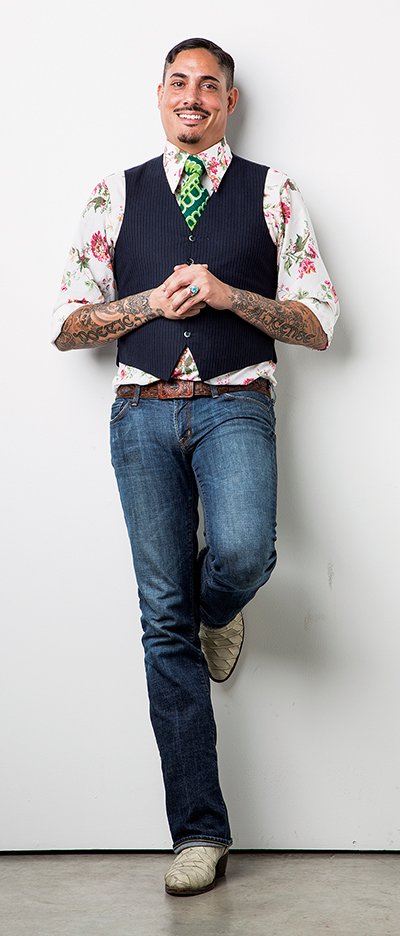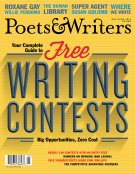The first features one notices about David Tomas Martinez are his heavily tattooed arms and neck. Soon after he sits down at the trendy bistro where we meet, in Houston’s Montrose neighborhood, the server pauses to look and asks without hesitation, “Wow, how many tattoos do you have?” Martinez chuckles and replies, “Just four: two sleeves, one on my neck, and one on my back.” The server shakes her head incredulously but lets it go.

It’s easy to be skeptical of his answer: The sleeves of tattoos look so complex—with skulls, feathers, and flower imagery interlocking with text at different points—that one suspects there must be more. “The words are a record of my life,” he says. To illustrate, he taps his chest and the image of the sacred heart that can be seen there. Above that, on his neck, are the words Homme de lettres in ink.
“I got this one after I was accepted to the PhD program at the University of Houston,” he explains. “It’s a promise to myself. A statement to live up to.”
Indeed, at thirty-seven, Martinez is certainly on his way to making good on that commitment. This spring, this man of letters moves one semester closer to completing his doctorate, just as his first book of poetry, Hustle, is released this month by Sarabande Books. As an expression of gratitude, he tattooed his press’s logo on his right wrist.
He’s particularly pleased that Sarabande supported his idea for the cover: the title simply “tattooed” on a plain white surface. The script matches the lettering on his own body. (Martinez also sports a Hustle tattoo above his right knee.) “Bryan Romero, my tattoo artist, designed it,” Martinez explains. “He’s done all my tattoos. I’m monogamous that way.”
“Some people might think it’s weird,” he says, “but each time I get more work done, I think about what it took to get here. I’m making better choices and these tattoos are telling the story.”
***
Martinez’s story begins in San Diego (the name of the city is tattooed on his left shoulder), on the United States–Mexico border. As the son of a Mexican American father and a white mother, ethnic identity wasn’t something he considered seriously—since both sides of the family were racially mixed—until one day, in elementary school, when one of his teachers pointed out that he had checked off a box identifying himself as “White/Caucasian.” At home that night, his mother corrected him: He was to check the box that read “Hispanic.”
“I cried,” Martinez remembers. “I thought I would have to sell gum and candy like the children who pushed their merchandise to our car window as we waited in line to exit Mexico.” It wasn’t until reaching adolescence, however, when his relationship with his parents became strained, that he started looking for a place to belong. “My parents divorced when I was twelve,” he says. “If I wasn’t going to be part of a home I would be part of the street.”
The streets of southeast San Diego were overrun by young black and Latino gang members. It seemed an attractive option for an adolescent who wanted to be part of something like a community. Between the ages of fifteen and nineteen, while in high school, he was entrenched in a black gang on whose turf his paternal grandparents lived: “We were one of the few Mexican families in what was called Lil Afrika, so there was no question I was part of the hood.”
In those four years, he was caught up in street fights and drug deals. His relationship with his parents became strained even further, especially after Martinez’s girlfriend, who was fifteen at the time, became pregnant. Only sixteen himself, Martinez had few prospects, so for the next three years he lived with his girlfriend’s family, a Hawaiian Scottish household with problems very similar to the ones he had experienced at home. The following year, when Martinez was seventeen, his first child, David Anthony, was born. Martinez and his girlfriend decided not to marry; deep down they recognized that it wasn’t love that had brought them—or would keep them—together.
At the time, he had considered committing fully to the gang by tattooing its name, Lil Afrika Piru, in Old English lettering across his belly. But the birth of his son made him reconsider. He quit high school just one credit shy of receiving his diploma in order to work at a shipyard. Shortly thereafter, when he chose to enlist at the behest of his family, he had to return to school to complete that single credit.
“It seemed like I was finally aiming for some sort of stability, so I quit the gangs, finished school, and joined the navy,” he says. Though he signed up for six years, he quit after only ten months. That feeling of not belonging took hold of him again and though he didn’t know yet what he was looking for, he knew for sure he hadn’t found it in the navy. “I knew there was something bigger than myself out there, and I was determined to find it,” he says.
Choosing a new path, he joined the U.S. Department of Labor’s Job Corps program to earn a house-painting certificate, and then he enrolled in Southwestern College in Chula Vista, California, “mainly to play basketball.” During the three-year period it took him to complete an associate’s degree, his second son, Isiah, was born, an event that did little to strengthen his relationship with his sons’ mother. “I’ve got Anthony’s name tattooed on the inside of my left forearm and Isiah’s on the inside of my right forearm,” he says. He regrets that he couldn’t spare them the fate of the broken home he knew too well. Four years into the relationship, he parted ways with his girlfriend, who took sole custody of their sons.
“I didn’t want to lose anything else,” he says, “so I held on to a book.” He means this literally: He carried a dictionary with him wherever he went for two years. “I had to duct-tape the binding,” he says. “People on the bus thought I was carrying a bible. And in a way, it did save me, just like the Good Book.” The hunger for words gave him the courage to enroll in the BA program, and eventually the MFA program, at San Diego State University. Those words also proved useful as he experimented with writing sonnets and other forms.









